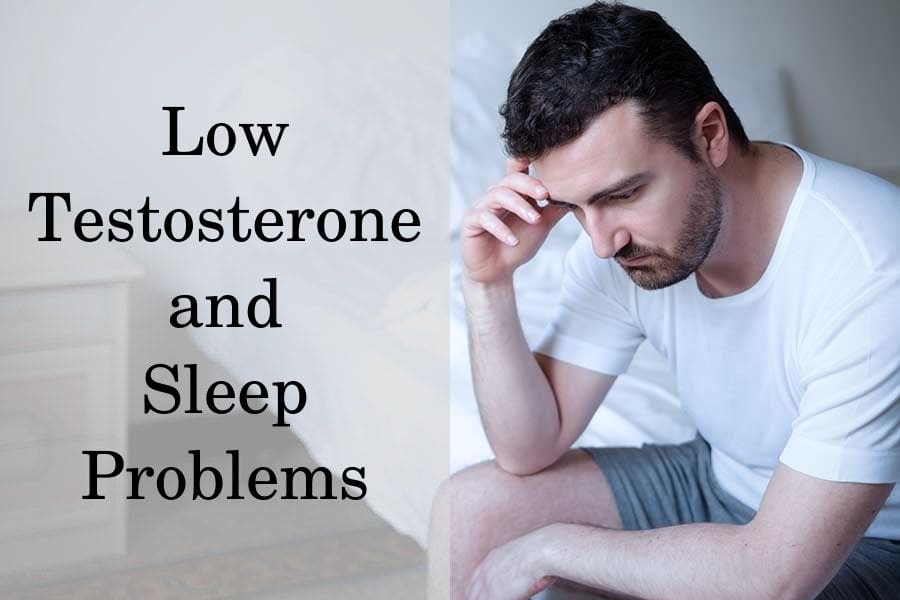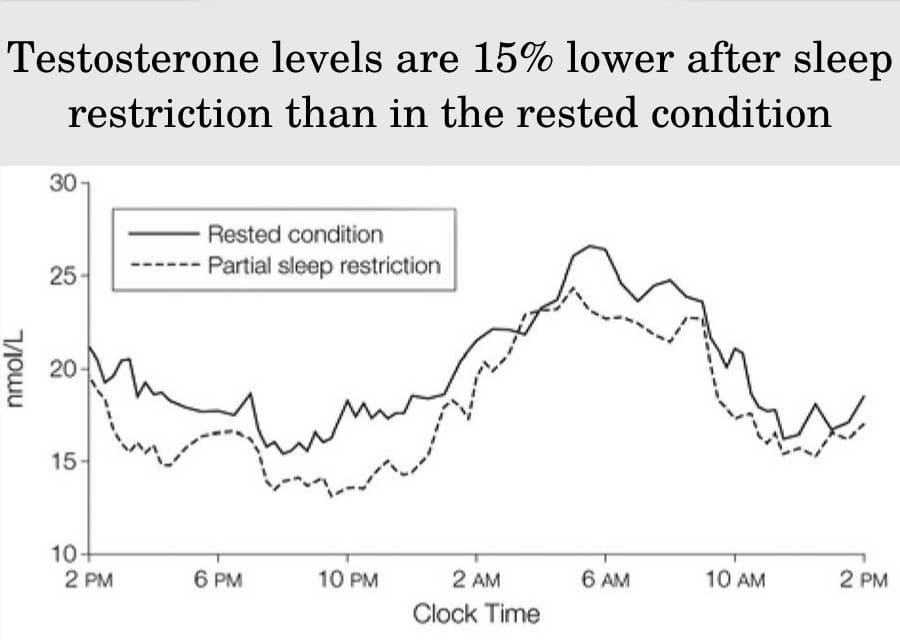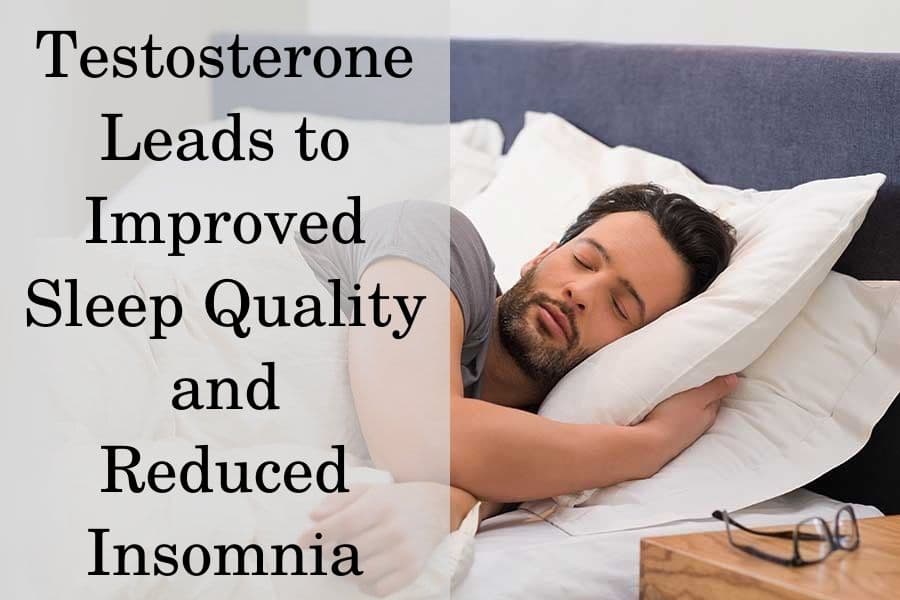Several hormones have profound effects on sleep, including thyroid hormones, melatonin, cortisol, and sex hormones.
The male sex hormone – testosterone is no exception, especially considering the fact that most of your T levels are produced while you sleep.
That is one of the reasons why sleep problems, such as sleep deprivation, insomnia, or poor sleep quality, can lead to a significant decrease in your testosterone.
While this may have no noticeable impact in the short term, long-term sleep problems can cut your T levels by half.
That is why low T is quite common in individuals with insomnia and chronic conditions that decrease sleep quality, like obstructive sleep apnea and type 2 diabetes.
What is more, the link between testosterone and sleep may go both ways since men with low T due to hypogonadism often experience sleep problems and excessive daytime sleepiness.
Can low testosterone cause sleep problems?
Patients with low testosterone often complain of increased daytime sleepiness, especially in combination with other low T symptoms, such as low energy levels and fatigue.
Currently, the exact mechanism via which low T has a negative impact on sleep is unknown. One of the possible mechanisms is an indirect negative effect of low testosterone on sleep quality by increasing the risk of obesity and sleep apnea.
A clinical trial in older men reported that low T is associated with decreased sleep efficiency, increased frequency of nighttime awakenings, and reduced deep sleep time.
Some researchers also suggest that the lack of inhibitory control of testosterone on cortisol in men with low T may be the underlying cause of decreased sleep quality. Cortisol is a stress hormone that is often associated with sleep problems.
Preliminary studies in mice suggest that testosterone may be important for certain sleep phases in males. Injecting testosterone in castrated test animals increased sleep duration and extended non-REM sleep.
How does lack of sleep affect T levels?
On the other hand, sleep disturbances such as insomnia or sleep deprivation have unfavorable effects on testosterone production even in men with otherwise normal T production.
Studies show that sleeping less than 5 hours for more than a week can lead to a 15% reduction in testosterone levels.
That’s likely because testosterone synthesis follows a specific rhythm in men and peaks during sleep. Sleep disturbances can disrupt one’s circadian rhythm, which leads to problems in testosterone synthesis as well.
In addition, sleep deprivation often leads to increased levels of stress and elevated cortisol, which may have a negative impact on testosterone synthesis as well.
In such cases, improving sleep quality can also help optimize T synthesis in healthy individuals.
Animal studies have raised concerns that some methods for improving sleep, such as melatonin supplementation, may lower T. Yet, human trials do not report any hormonal changes after melatonin supplementation.
Does low testosterone cause insomnia in men?
Low T may increase the risk of insomnia, and some scientists consider sleep disturbances as a sign of severe hypogonadism. One of the possible causes of insomnia in men with low T could be the lack of suppression of cortisol production.
Cortisol is well known as the stress hormone, but it also stimulates wakefulness and typically spikes in the morning, right after waking up. The phenomenon is also known as the cortisol awakening response (CAR).
Increased cortisol in men with low T could potentially reduce their sleep quality and increase the risk of insomnia or interrupted sleep.
Yet, insomnia is a non-specific symptom, and it is not considered a typical sign of male hypogonadism. Insomnia may also be the result of other conditions tightly linked to low T in men, such as anxiety and depression.
Can sleep apnea cause low testosterone?
Obstructive sleep apnea (OSA) is often associated with decreased testosterone levels. Scientists explain that low T is a common finding amongst OSA patients due to a couple of reasons.
First of all, sleep apnea is often caused by obesity, which in turn can lead to low T levels as well. Studies report that moderate obesity leads to low total T while free T remains in the reference. Yet, severe obesity is associated with a decrease in both total and free T.
Secondly, sleep apnea decreases sleep quality which is known to have a detrimental effect on testosterone production. Some studies also report that OSA treatment may help increase T levels in these patients by improving sleep quality.
Yet, the majority of the evidence does not support the effectiveness of OSA treatment on increasing testosterone levels. Thus, weight loss remains the most effective method for improving T in men with obstructive sleep apnea.
How TRT improves sleep problems
If you have low testosterone levels due to hypogonadism, testosterone replacement therapy (TRT) is widely considered the most effective treatment for managing your symptoms, including sleep problems.
For example, our patients report that TRT leads to significant improvement in sleep, quality of life, and sexual function compared to placebo. TRT also reduced symptoms of insomnia and daytime sleepiness as well.
Postponing your treatment may lead to progressively worse sleep. That’s because the longer low T is left untreated, the higher the chance for abdominal obesity and developing additional sleep disturbances such as sleep apnea.
If you already have obstructive sleep apnea, you should notify your medical doctor before receiving a TRT prescription. That’s because testosterone therapy can worsen the condition in patients with uncontrolled and severe OSA.
TRT may affect the neuromuscular tonus of the airways, increase your metabolic requirements for oxygen and change your body’s response to oxygen deprivation. Therefore, severe OSA may become worse during TRT.
3 tips for better sleep with low T
Sleep quality and testosterone levels both depend on several lifestyle factors, such as your physical activity levels, body composition, and environmental factors.
Losing weight if you are obese will also help improve both your testosterone levels and may potentially boost your sleep quality, according to research.
Exercise is also a great way to boost both sleep quality and testosterone levels. Plus, it will help you burn more calories and support weight loss. HFS doctors support that moderate-intensity exercise is sufficient for improving sleep.
Regular exercise has long-term benefits for testosterone production and leads to significantly higher T levels compared to sedentary men.
Improving your sleep environment can also lead to better sleep. This recommendation includes going to bed at the same time every night, ensuring complete darkness in your bedroom, optimizing your bedroom temperature, and avoiding sources of blue light before bedtime.
Furthermore, exposure to blue light or direct sunlight in the morning will help increase wakefulness and synchronize your circadian rhythm with your regular bedtime routine.
According to research, sleeping more than 8 hours is best for optimal testosterone levels in healthy individuals. Sleeping 4-6 hours was associated with 10-15% lower T levels, while the participants sleeping less than 4 hours had 40% lower testosterone.
If you have low testosterone due to a clinical condition such as hypogonadism, then receiving appropriate treatment will help you manage all debilitating symptoms of low T, including sleep problems and insomnia.
Make sure to consult with an experienced medical specialist such as an endocrinologist in order to receive adequate treatment and continuous monitoring for safe and effective therapy.
Get a free consultation with our medical expert for any questions about hormone replacement therapy



